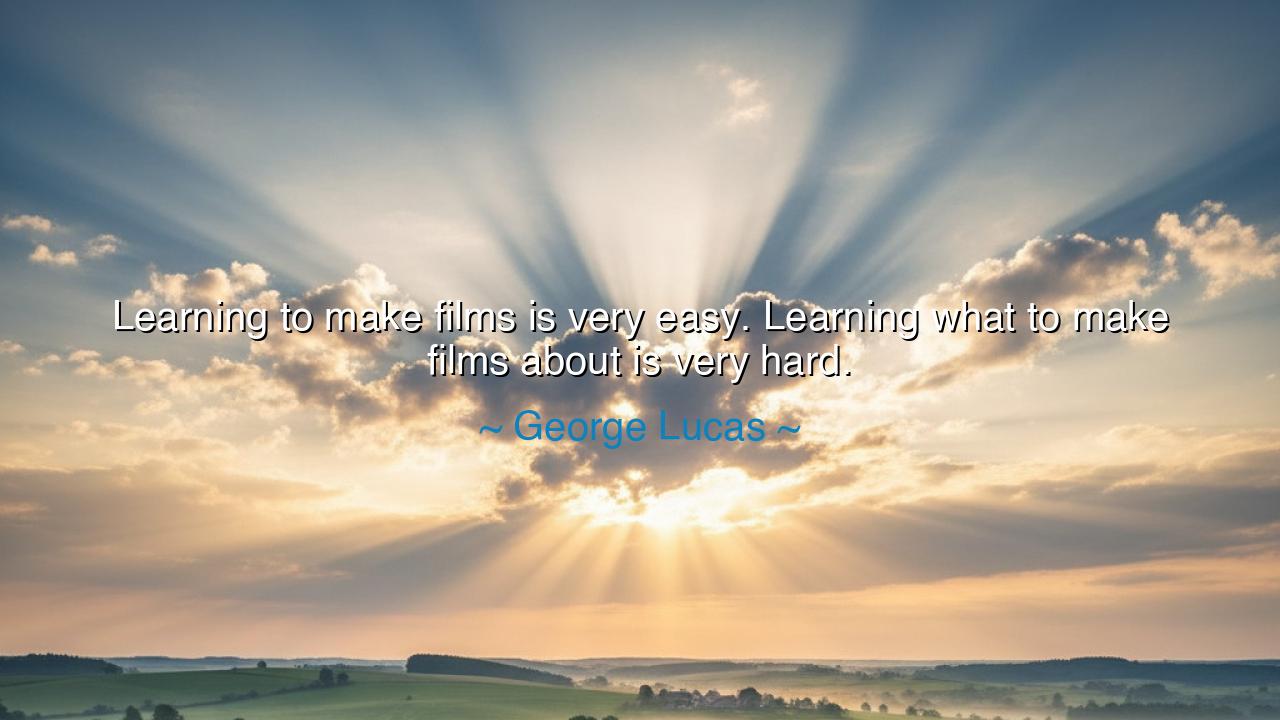
Learning to make films is very easy. Learning what to make films






There are words that draw a line between craft and calling, between the hands that build and the heart that envisions. George Lucas, the architect of galaxies far, far away, once spoke such words: “Learning to make films is very easy. Learning what to make films about is very hard.” In this simple reflection lies a truth that reaches beyond cinema — a truth about all art, all creation, and all human endeavor. For technique may be mastered through effort and repetition, but meaning must be discovered through depth, reflection, and the courage to confront one’s own soul.
The meaning of Lucas’s statement is that the tools of creation — the camera, the brush, the pen, the chisel — can be learned by anyone with discipline. Skill belongs to the realm of the mind and the body. Yet to know what to create, what stories to tell, what truths to bring to life — that belongs to the realm of the spirit. The act of creation without purpose is like a beautifully built ship without a compass: impressive, but lost. What Lucas reminds us is that art becomes great not through mastery of form, but through understanding of essence — through knowing what one wishes to say about humanity, love, fear, and destiny.
The origin of this wisdom comes from Lucas’s own journey. As a young filmmaker, he was fascinated by technology and form — the mechanics of editing, sound, and special effects. Yet it was not until he began to explore the why behind his storytelling that his work became immortal. In creating Star Wars, Lucas did not merely craft a spectacle of light and motion; he gave life to an epic myth — a modern expression of ancient archetypes. Drawing from Joseph Campbell’s philosophy of the “Hero’s Journey,” he told a story about the struggle between darkness and light, about redemption, courage, and the eternal search for belonging. This is why his work endures — because beneath its innovation beats the heart of timeless truth.
This challenge — to know what to create about — is as old as art itself. The ancients wrestled with the same question. The sculptors of Greece could carve marble to perfection, but only those who captured the divine spirit within stone were remembered. The playwright Sophocles mastered not just dialogue, but the moral tragedy of man. And Leonardo da Vinci, though trained as an engineer and anatomist, spent his life seeking the mystery of the human soul behind every face he painted. Each of these masters learned what Lucas learned: that technique is the foundation, but vision is the soul.
In our modern age, the same tension persists. We live in a time when learning a craft is easier than ever — tools and tutorials abound, and technology shortens the path to competence. But the harder question remains: what will you say with your craft? For it is not the skillful that history remembers, but the truthful. The world is full of beautiful works that say nothing, of songs that echo but do not speak, of films that dazzle but do not move. Yet a single imperfect story that carries the weight of the human heart can change lives forever.
The deeper teaching in Lucas’s words is that purpose must guide creation. To find what one’s art should express requires a journey inward — a confrontation with one’s values, wounds, hopes, and questions. True artists are not those who invent, but those who reveal. They reach into the shared soul of humanity and bring forth what we all feel but cannot say. To create from such a place is difficult, for it demands vulnerability and reflection, but it is the only path to work that endures. In this way, every creator must first become a philosopher of their own existence.
Let this be the lesson passed down to all who seek to create — whether in art, in leadership, or in life: do not be content to know how to build; strive to know what is worth building. Learn your craft, but never mistake craft for meaning. Ask yourself, “Why do I create? What truth must I tell? What beauty must I reveal?” For the hands may craft the form, but it is the heart that breathes life into it. As George Lucas discovered, learning the tools of creation may take a few years, but learning the purpose of creation may take a lifetime — and it is that lifelong journey that transforms skill into wisdom, and work into legacy.






AAdministratorAdministrator
Welcome, honored guests. Please leave a comment, we will respond soon